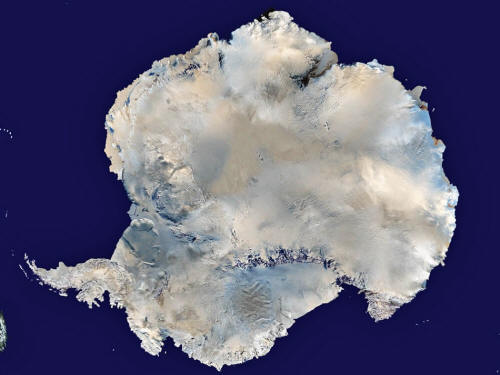|
This mission involved 4700 soldiers, 13 ships, and 33 aircraft in what was officially called a research expedition. The part of the story that is seldom told outside of official circles is what Byrd encountered there.
While conventional knowledge of World War II states that Germany was defeated in Europe, which is true, little is often said about the Nazi escape South to their bases in Antarctica.
While the Allied powers won World War II on the ground in Europe due to their industrial might, the Nazi's had far more advanced technology, and many members of Hitler's regime reportedly fled to the icy continent after the war.
It is highly likely Operation Highjump was a military operation to engage these enemy forces, and was apparently unsuccessful, as Byrd and his battle group suffered heavy losses and retreated to South America.
A Chilean newspaper, 'El Murico', ran an article detailing Operation Highjump on March 5th, 1947, where Admiral Byrd stated in an interview:
German secret societies, such as the Thule and Vril, are believed to already have had access to electrogravitic, or antigravity, technologies, and had created what is known as the "Bell craft", named after it's bell like shape.
These craft, with their advanced propulsion systems, are thought to have been effective in neutralizing the 13 ship battle group. In the years after World War II, many Nazi scientists immigrated into America to work within the medicine, aerospace, and intelligence corporations.
This situation makes one wonder if American hands were essentially forced to accept these refugees.
The world then entered the Cold War years, but the mystery surrounding Antarctica persists.
In 1959, the Antarctica Treaty was signed by 12 nations, including Argentina, Chile, the UK, the US, and the Soviet Union, who had scientists operating in and around Antarctica. Fast-forwarding nearly 60 years, another Antarctic protection deal was recently ratified in October 2016, this time signed by 24 different nations along with the European Union.
This set aside the largest marine conservation area in the world.
Now the question is, why are America, China and Russia cooperating on the preservation of the wildest regions of planet when so many of their current policies are producing increased enmity and tension, and the rest of the world has become an expendable war zone?
At the same time, there has been a rise in reporting on events in Antarctica, albeit mostly from tabloid journals.
On November 21st, an article in The Sun, reported on "mysterious new pyramids" found buried on the icy continent, largely discussing a video showing Google Earth images detailing geometric, pyramidal structures in the icy tundra.
Another article, this time by The Express, also detailed these pyramid structures, while outlining scientific evidence supporting the theory that Antarctica used to harbor vegetation and life.
Lastly, The Daily Star published an article also describing how an ancient civilization would have been possible due to the scientific discoveries that Antarctica was possibly ice-free in the past, also touching on the intriguing Piri Reis map, a 500-year-old document showing Antarctica on it, centuries before the official discovery of the icy continent.
Oddly enough, several significant figures have recently traveled to the Antarctic region in recent months, and under mysterious or vaguely defined circumstances.
During the election, Secretary of State John Kerry flew down to the continent to 'study global warming.' Former Astronaut Buzz Aldrin also visited in recent weeks, and was forced to cut short his journey due to a sudden medical emergency.
Furthermore, other notable researchers have been reporting in recent weeks on the potential for a "partial disclosure scenario" involving Antarctica, with the potential to reveal,
However, such speculation is above and beyond what we can actually prove at this point.
Nevertheless, continuing Antarctic research expeditions, combined with,
...are giving rise to a growing public curiosity about what may really be happening on the uninhabited continent.
|



